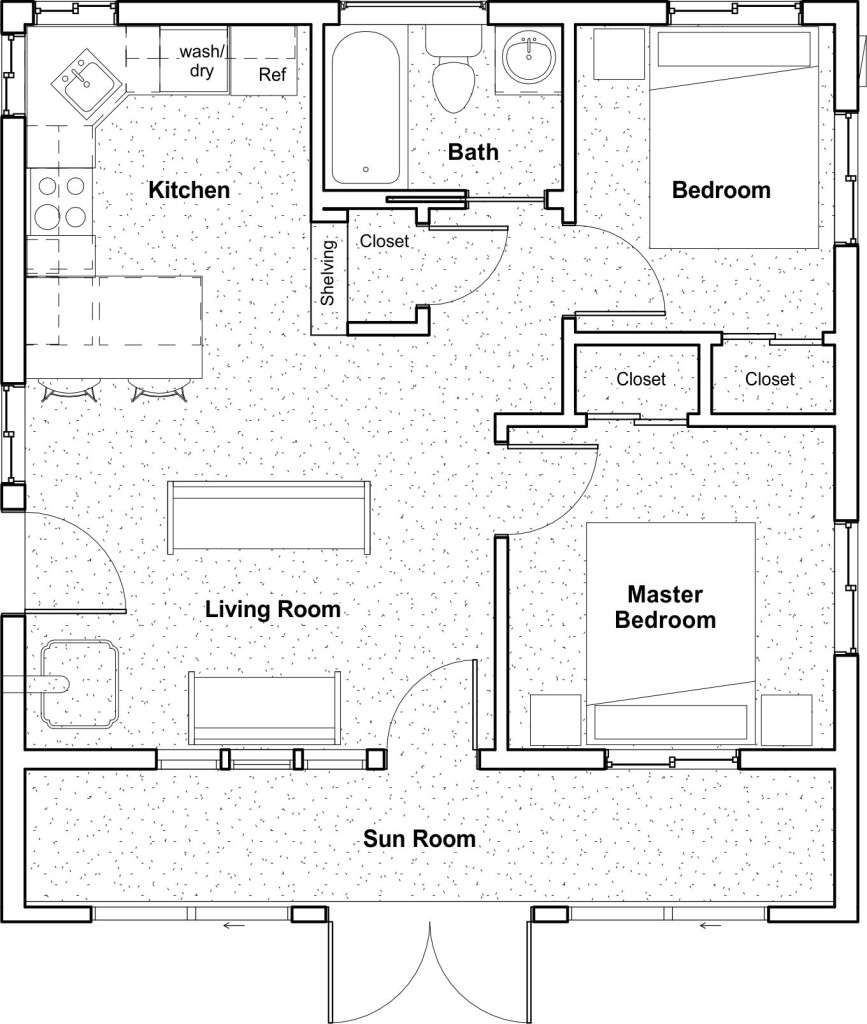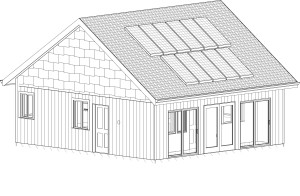Welcome to the future of Energy Independent Home Building:
A True and Affordable Net Zero Carbon Footprint Home Possible due to Unique and Integrated Design Features:- 4.15 Kw Grid Tie PV system
- Passive Solar Space Heat Collection
- Integrated Heating and Distribution System
- Concrete Floors for Thermal Inertia Mass
- Six Sided Super Insulated Building Envelope
- High Performance Windows and Doors
- Energy Engineered, HERS 0 = NO PROJECTED UTILITY BILL! **
- Green Finishes = Healthy Interior and Sustainable Products
 This Creative Compact Design gives you:
This Creative Compact Design gives you:
- 575 SF finished living space
- 100SF Sun Space
- An ample Kitchen/Living/Dining area
- Simple Bathroom with deeper tub for soaking
- 2 bedrooms
- 4.15 KW photovoltaics (extra cost of $13,300 before rebates, see below)
- Optional wood or gas parlor stove
- Loft storage space
 This Home equipped with the PV array is eligible for $6,000 rebate on a mortgage at closing from the Colorado Energy Savers Mortgage program, $4,000 in federal rebates as a rollover credit on income tax, and $10/mo. for 10 years from Xcel Energy (=$1,200).
Add that up and that is $11,200 of rebates on a $13,300 system i.e. the system only ends up costing $2.100. Now figure in no projected utility bill, a savings of roughly $100/mo. and this system is paid off in under 2 years. After that, no utility bill for the life of the PV system (projected decline is .8% per year) And note: utilities are going up about 3% per year...
This Home equipped with the PV array is eligible for $6,000 rebate on a mortgage at closing from the Colorado Energy Savers Mortgage program, $4,000 in federal rebates as a rollover credit on income tax, and $10/mo. for 10 years from Xcel Energy (=$1,200).
Add that up and that is $11,200 of rebates on a $13,300 system i.e. the system only ends up costing $2.100. Now figure in no projected utility bill, a savings of roughly $100/mo. and this system is paid off in under 2 years. After that, no utility bill for the life of the PV system (projected decline is .8% per year) And note: utilities are going up about 3% per year...
BUILDING ENERGY INDEPENDENCE ONE HOME AT A TIME
What’s a Grid Tie System? In brief, the Power Grid serves as a year long battery. In the warm season-longer days- the meter turns backwards accumulating credit. In the cool months-shorter days-the meter turns forward due to needed heating, particularly on cold cloudy days. NET ZERO means your average energy production over the course of the year comes out to Zero = NO UTILITY BILLS What’s a HERS rating? HERS stands for Home Energy Rating System. A house built to today’s code standards achieves a rating of 100. The sample design shown here achieves a rating of Zero with its basic PV system. Add more PV’s and the house could power an electric/hybrid car. Cost to Buy versus Cost to Own With its additional features a Hybrid Home will cost more than a standard home. However, with no utility bill, the Cost to Own is decreased. Typical average savings in a Colorado climate for a 1700SF home is on the order of $200 per month. Instead of financing a $282,000 home, you are literally only financing a $262,000 home. Many Lenders now understand these Green features and their financial advantages. “Let the environment save us”
